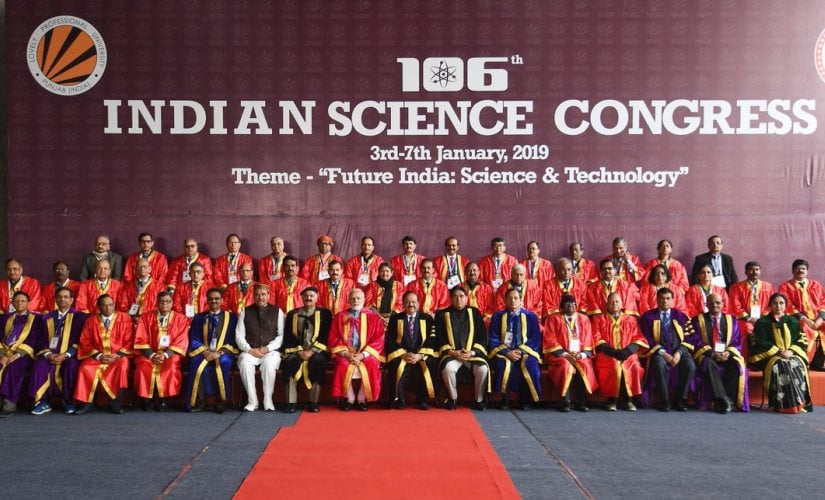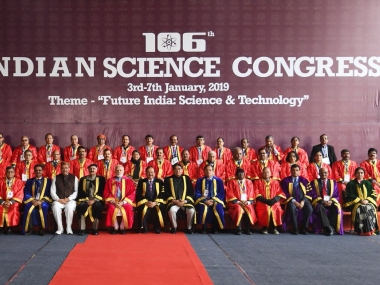The recently concluded 106th Indian Science Congress (ISC) — with its impressive list of attendee scientists, including Nobel laureates from 60 countries — had the fantastic focal theme of ‘Future India: Science and Technology’, spanning topics from agriculture, veterinary and fishery sciences, chemical and material sciences, ICT, medical and physical sciences, to anthropology and archaeology. But just when there was widespread admiration for the hard work and planning that had gone into organising the ISC, something shocking transpired. Its fallout included one of our most respected and internationally acclaimed scientists — Bharat Ratna Prof CNR Rao — disassociating himself from the ISC. The incident was a talk on 5 January, during which Andhra University vice chancellor Prof G Nageswara Rao (a professor of inorganic chemistry) claimed that the Mahabharata’s Kauravas were born out of nearly 1,000-year-old stem cell research and a test tube fertilisation process “that this country had known thousands of years ago”. The audience comprised mainly children. Rao also referred to the 24 different types of aircraft that Ravana was supposed to have possessed, and claimed that Sri Lanka — at that time — had airports. He challenged Darwinian Theory, saying the 10 incarnations of Lord Vishnu were much more advanced in explaining Evolution. [caption id=“attachment_5876021” align=“alignnone” width=“825”]  Indian Science Congress 2019. Image courtesy: Twitter/@narendramodi[/caption] During the same session, another scientist — a Dr KJ Krishnan — declared that Newton and Einstein had little knowledge of Physics and misled the world with their theories. Krishnan claimed that his own theory of gravitational phenomenon would provide a better understanding of gravitational waves, which he suggested should be renamed “Narendra Modi Waves”. He recommended that gravitational lensing should be known as the “Harsh Vardhan Effect” [after the minister for Science and Technology]. Exactly a year ago, Indian scientists had been left embarrassed when Satya Pal Singh, then minister for Higher Education, proclaimed that Darwin’s theory was “scientifically wrong” and how evolution was taught “needed to change” in school and university curricula. He noted that “our ancestors, in written or oral form, did not mention that they saw an ape turning into a man”. In late 2014, Prime Minister Narendra Modi himself declared at the opening ceremony of a hospital in Mumbai that modern medical achievements like plastic surgery, cloning and in-vitro fertilisation were all practiced in ancient India. While many Indians just laughed it off, the Indian science community has been deeply upset with such pronouncements. Do we call these ‘pronouncements’ pseudo-science or brush them aside as ‘crackpot science’? We know that they’re both equally wrong, and while the latter has no scientific pretensions, pseudo-science is careful to present its claims draped in all the trappings: lab coats, test tubes, instruments, etc. In fact, people are often misled by pseudo-science because it looks very much like real science. We might have the occasional laugh about these statements and the gullibility of those who believe them. But there seems to be a growing wave of such sensational ‘pseudo-science news’ which is often presented as valid science. As scientists or believers in science, assuming that truth exists and is worth searching for, and that science is our most reliable tool in that search, how do we combat fake or pseudo-science effectively? Today, the Indian government seems to show scant regard for the development of a scientific temper and the spirit of inquiry and reform. And the most disturbing aspect of the pseudo-scientific public proclamations is, that of late, they seem to be on the rise — both in perception and reality. The Indian scientific community is facing a real crisis. We are seeing an alarming escalation in the number of such claims. The problem in India for science and evidence-based policy seems to be that politicians and other political actors are out to discredit (or bend) the science on which a conclusion is based, to support their policy position. Also read — Indian Science Congress: What allusions to ancient aircraft, 'Krishnanian Physics' reveal about Hindutva insecurities Such ‘bending’ of science comes in a variety of forms: cherry-picking studies and experts that support the government’s perspective; harassing scientists — via cuts in funding or investigations — whose conclusions weigh against policies the government prefers etc. The majority of the scientific community in India (like their peers elsewhere) is searching for the truth, sometimes at great personal cost. They are trying to work on solving scientific problems with great humility, and as true scientists, their reticence to speak in absolutes distinguishes their work from pseudo-science. A few hundred years ago, scientists had a challenge on their hands when it came to convincing people of the validity of their research. Today, things are different: people are more scientifically literate and tend to retell every research story they hear — even the ones that are only worthy of sharing on April Fools’ Day. But, in India, in spite of this generalised positive view of science, the public does not know much about the specifics of how science occurs, which includes a lack of awareness about the scientific research that is conducted in the country. Scientists are worried that given this scenario, this lack of knowledge leads to expectations for quick solutions to difficult problems, and hampers people’s ability to distinguish well-founded scientific claims from their opposite. This combination — institutional challenges to respecting the scientific community and their work and the government’s disregard for scientific evidence on a variety of matters — has broad and ominous implications beyond how science informs national policies. Should more scientists and the general public in India join the crusade against the onslaught of silly pseudo-scientific claims and the disregard for science that might threaten its viability, integrity, legitimacy and utility in the international science and technology arena? Remember what Richard Feynman said: “Science is a way of trying not to fool yourself”. I am sure none of us want to be fooled! Aruna Dhathathreyan is an Emeritus scientist and Professor at CSIR-Central Leather Research Institute, Chennai, India. Her fields of work and research include biophysics, biophysical chemistry, and surface sciences. The opinions expressed by the author in this column do not reflect those of her organisation.
Should more scientists and the general public in India crusade against the onslaught of silly pseudo-scientific claims and the disregard for science that might threaten its viability, integrity, legitimacy and utility in the international arena?
Advertisement
End of Article


)

)
)
)
)
)
)
)
)



